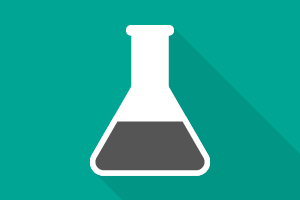Classroom Resources: Energy & Thermodynamics
Filter by:
1 – 10 of 10 Classroom Resources
-

Electromagnetic Spectrum, Radiation, History | High School
Lesson Plan: NMR and MRI: Applications in Chemistry and Medicine Mark as Favorite (3 Favorites)
In this lesson, students will learn about NMR and MRI imaging by reading an article and engaging in related activities. The activities help promote literacy in the science classroom. Parts of this lesson could be used as plans for a substitute teacher.
-

Electromagnetic Spectrum, Radiation | High School
Activity: Investigating Infrared Light Mark as Favorite (4 Favorites)
In this activity, students will use a phone camera to see the infrared light emitted by a television remote. They will use the electromagnetic spectrum to compare the energy of infrared light to visible light and make conjectures related to other types of light.
-

Radiation, Molecular Structure, Polarity, Heat | High School
Lesson Plan: Why Does Carbon Get Such a Bad Rap? Mark as Favorite (4 Favorites)
In this lesson, students will use a climate change scenario to understand the role that polar bonds play in whether a molecule can be considered a greenhouse gas, while learning the particle nature of matter-energy interactions.
-

Radiation, Electromagnetic Spectrum, Heat, Temperature, Experimental Design, Graphing, Interdisciplinary | Middle School, High School
Lesson Plan: The Ozone Layer Mark as Favorite (8 Favorites)
In this lesson, students will develop an explanation for the consequences of ozone depletion on Earth by planning and carrying out an investigation. Students will use analysis and interpretation of data to develop a model to explain the cause and effect of Ozone depletion on the planet Earth.
-

Electromagnetic Spectrum, Radiation | Middle School, High School
Lab: The Most Effective Sunscreen Mark as Favorite (32 Favorites)
In this lab, students will research and compare the effectiveness of various SPF levels in sunscreen lotions. The lotion’s ability to block UV (ultraviolet) radiation from the sun will be tested using a UV bead detector.
-

Interdisciplinary, Physical Properties, Chemical Properties, Molecular Structure, Chemical Bond, Radiation | High School
Lesson Plan: Chlorofluorocarbons and Ozone Depletion Mark as Favorite (15 Favorites)
In this lesson, students will learn about the history of chlorofluorocarbons (CFCs) and the harm they cause the ozone layer through an article reading. There are a series of activities to help promote literacy in the science classroom related to the reading. This lesson could be easily used as plans for a substitute teacher, as most of the activities are self-guided.
-

Electromagnetic Spectrum, Heat, Radiation, Physical Properties, Chemical Properties, History, Interdisciplinary, Functional Groups, Molecular Structure | High School
Lesson Plan: Mars Exploration with Infrared Spectrometers Mark as Favorite (15 Favorites)
In this lesson, students will learn about how space scientists used infrared spectrometers to explore Mars through an article reading. Space exploration involves a lot of chemistry, which many students are surprised to learn. There are a series of activities to help promote literacy in the science classroom related to the reading. This lesson could be easily used as plans for a substitute teacher, as most of the activities are self-guided.
-

Pros Cons of Nuclear Power, Combustion, Acid Rain, Radiation, Renewable Energy, Radiation | High School
Activity: Town Meeting Mark as Favorite (38 Favorites)
In this activity, students will learn about acid rain, gas scrubbers, half-life, chain reactions, and other topics around electricity production through a debate on nuclear power.
-

Pros Cons of Nuclear Power, Radiation, Radiation, Renewable Energy, Interdisciplinary, History | High School
Activity: Nuclear Energy Debate Mark as Favorite (41 Favorites)
In this activity, students will watch a debate between experts on the merits and drawbacks of nuclear energy. They will use this debate, as well as additional research, to write a short position paper on whether or not to continue using nuclear energy that explains and defends their opinion, as well as the chemistry involved in nuclear energy production.
-

Pros Cons of Nuclear Power, Radiation, Radiation, Renewable Energy, Interdisciplinary, History | High School
Activity: Nuclear Energy Power Plants Mark as Favorite (30 Favorites)
In this activity, students will conduct research and write a persuasive essay in which they state an opinion about whether the number of nuclear plants should be increased or decreased.